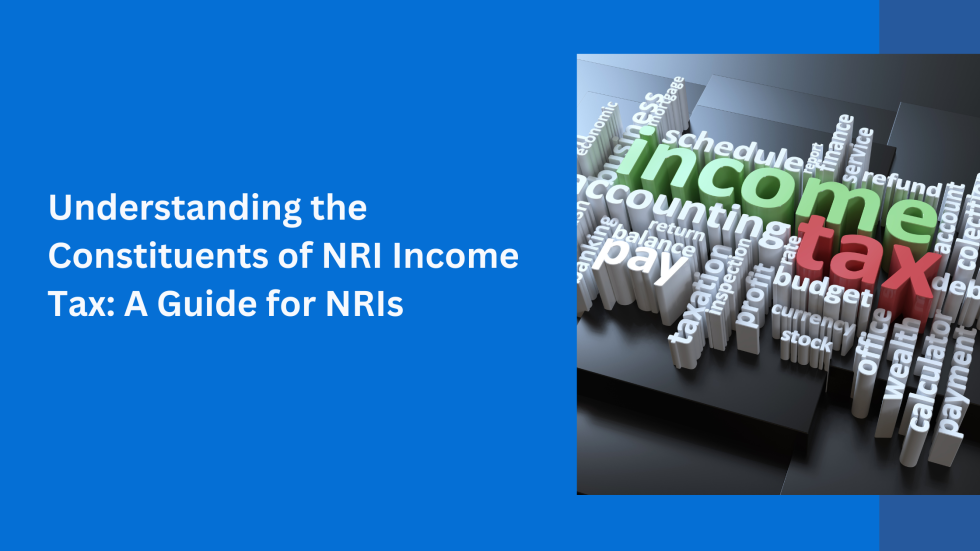Navigating NRI income tax can be complex, especially when you’re earning in both India and abroad. The tax implications for Non-Resident Indians (NRIs) are significantly different from residents, and it’s important to understand how income from India is taxed and what exemptions are available. This comprehensive guide covers everything NRIs need to know about income tax in India, including income sources, tax obligations, and effective tax planning strategies.
What is NRI Status?
An NRI (Non-Resident Indian) is defined based on the individual’s duration of stay outside India. The criteria for determining NRI status vary under the Income Tax Act, Foreign Exchange Management Act (FEMA), and the Reserve Bank of India (RBI).
- RBI Definition: An individual is considered an NRI if they have stayed outside India for more than 182 days during the preceding financial year.
- Income Tax Act Definition: An individual is an NRI if they stay in India for less than 182 days during the previous year or less than 60 days in the current year and a total of 365 days or less in the preceding four years.
- FEMA Definition: Under FEMA, an individual is an NRI if they have been residing outside India for more than 182 days during the preceding financial year or with the intention of staying abroad for an indefinite period.
Each of these definitions has its specific implications for tax compliance, especially when it comes to income earned both in India and abroad.
Income Tax Implications for NRIs
Once you qualify as an NRI, your tax obligations in India change significantly. Here’s how:
- Resident Tax Status: A resident Indian is taxed on their global income, which includes income earned both in India and abroad.
- NRI Tax Status: As an NRI, you are only taxed on income that is earned or accrued in India. This includes income from rental properties, dividends, capital gains from Indian assets, etc. Your global income is not taxed in India unless it is brought into India.
For instance, Raj, an NRI, earns rental income from his property in India and salary income from the USA. While his salary is not taxed in India, the rental income he receives from his property is taxable in India.
The Role of Double Taxation Avoidance Agreement (DTAA)
India has signed Double Taxation Avoidance Agreements (DTAA) with several countries, which prevents NRIs from being taxed twice on the same income. However, not all countries fully implement DTAA provisions, and some states (e.g., in the USA) might still tax you at the state level even if you are eligible for relief under the federal DTAA.
For NRIs, it is important to understand the DTAA provisions applicable between India and their country of residence, as this can provide significant tax relief.
Key Components of NRI Income Tax
Here are the key components that determine NRI income tax:
- Income Earned in India:
- Salary: Salary income from services rendered in India is taxable in India.
- Property Income: Rental income from properties in India is subject to tax in India.
- Capital Gains: Any capital gains from the sale of assets like real estate, shares, or bonds in India are taxed under capital gains provisions.
- Interest Income: Interest from savings accounts, fixed deposits, or bonds in India is taxable.
- Income Earned Outside India:
NRIs are not taxed on income earned outside India unless it is brought into India. However, foreign income may be subject to taxes in the country of residence.
Tax Exemptions and Deductions for NRIs
To help reduce the tax burden, there are several tax exemptions and deductions that NRIs can avail themselves of:
- Section 80C: NRIs can claim tax deductions for investments in savings instruments such as Public Provident Fund (PPF), National Savings Certificates (NSC), etc.
- NRE/NRO Accounts: Interest earned in NRE accounts is tax-free in India, whereas interest from NRO accounts is taxable.
- Section 54: NRIs can claim a tax exemption on long-term capital gains by reinvesting the proceeds from the sale of property into another residential property in India.
- Section 54F: Applies to capital gains from non-property assets like land or shares. The proceeds must be reinvested in a residential property.
- Section 54EC: NRIs can invest in government-approved bonds like NHAI or REC within six months of selling a property. This investment comes with a maximum limit of ₹50 lakhs per year and a five-year lock-in period. The interest earned is taxable.
Tax Filing for NRIs
While NRIs may not need to file taxes on their global income, they must file an Income Tax Return (ITR) for income earned in India, such as property income, dividends, and capital gains. NRIs are required to file their tax returns in the prescribed format by the Income Tax Department. Additionally, NRIs may claim tax credits for taxes paid in their country of residence under the DTAA.
Importance of NRI Status for Tax Purposes
It’s essential for NRIs to track the number of days spent in India, especially when traveling frequently. If an NRI spends more than 182 days in India during a financial year, they may lose their NRI status, which can have significant tax implications. To keep track of this, NRIs can use tools like an NRI status calculator to maintain accurate records.
Common Misconceptions About NRI Taxes
There are several misconceptions about NRI taxes that need clarification:
- Myth: NRIs cannot invest in India.
- Fact: NRIs can invest in Indian markets, including real estate, stocks, and bonds. However, there are restrictions on purchasing agricultural land.
- Myth: NRIs are taxed on global income.
- Fact: NRIs are only taxed on income earned in India. Their global income is not subject to Indian taxes unless brought into India.
Conclusion
Understanding the constituents of NRI income tax is essential for efficient tax planning. By being aware of tax obligations on income earned in India, taking advantage of tax exemptions, and maintaining accurate NRI status records, NRIs can ensure compliance and avoid unnecessary penalties.
At NRI Edge, we specialize in assisting NRIs with tax filing, financial planning, and investment strategies. Whether you need guidance on NRI taxation, capital gains, or compliance, our expert team is here to help.
Frequently Asked Questions (FAQs)
Q1: Which income of NRI is taxable in India?
A1: NRIs are taxed on income earned or accrued in India, such as rental income, dividends, and capital gains. Income earned outside India is not taxed unless brought into India.
Q2: How many days can NRIs stay in India without tax?
A2: An NRI can stay in India for more than 182 days in a financial year, but doing so will change their status from NRI to Resident. To maintain NRI status, they must stay in India for less than 182 days.
Q3: Do OCI holders need to pay tax in India?
A3: Overseas Citizen of India (OCI) cardholders must pay income tax on income earned in India. They should file their income tax return (ITR) for income earned in India.
Q4: Does an NRI need to file an income tax return in India?
A4: Yes, NRIs should file an Income Tax Return (ITR) if they have taxable income in India, even if no tax is due. Filing an ITR ensures compliance with tax regulations.
Q5: Is an NRO account taxable in India?
A5: Yes, an NRO account is taxed at a rate of 30% on income accrued in India, along with an additional 3% cess. Interest earned from NRO accounts is also taxable, although interest up to ₹10,000 is eligible for deduction under Section 80TTA.






